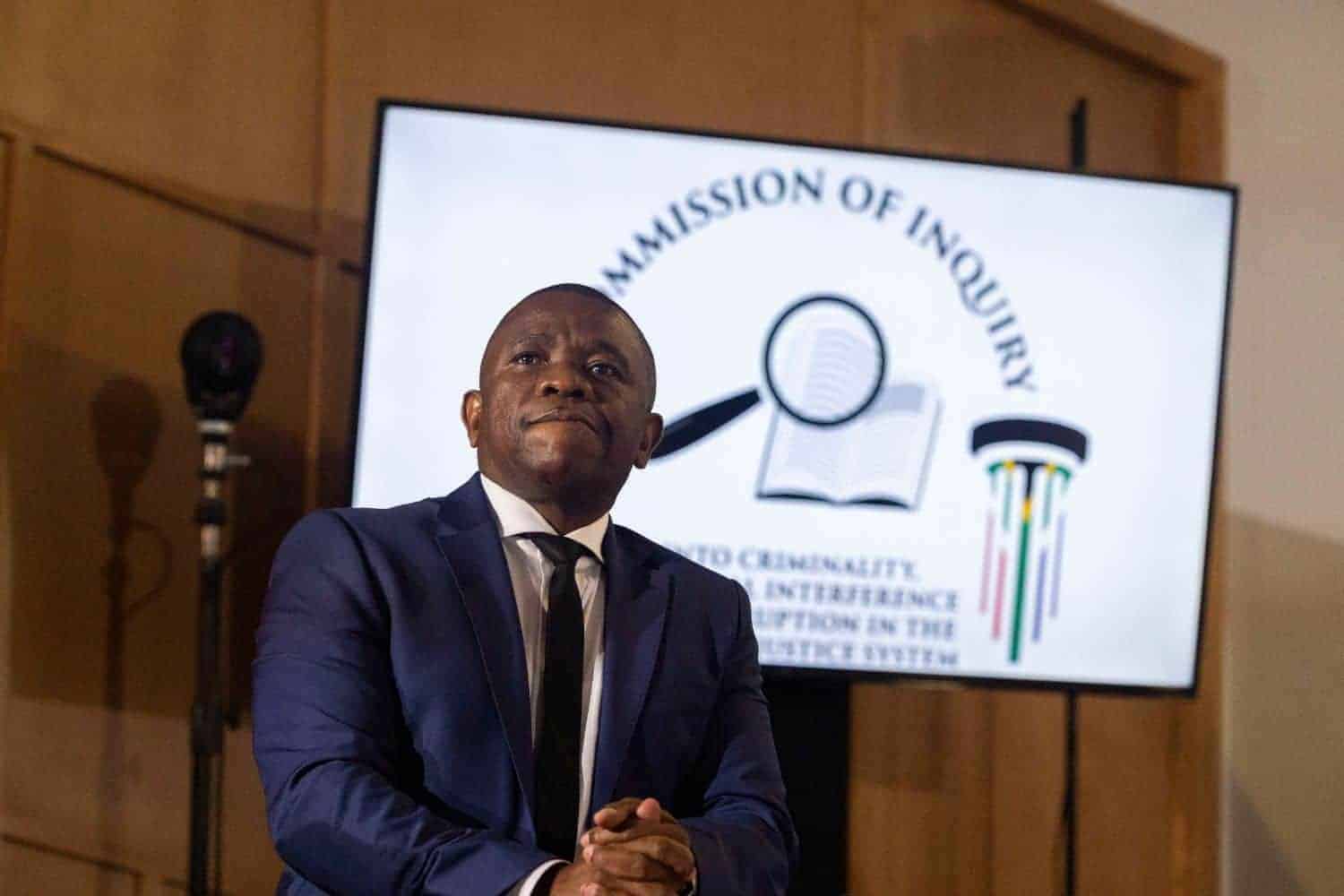Here's a recap of what the Madlanga commission has heard so far and questions that still need answers.

On Wednesday, 17 September, the much-awaited Madlanga commission began with its public hearings, with KwaZulu-Natal police commissioner Nhlanhla Mkhwanazi taking the stand as the first witness.
This followed his media briefing on 6 July, in which he levelled several allegations against police management and the judiciary, among others.
His testimony at the Madlanga commission, spanning over three days, delved deeper into his allegations.
On his first day before presenting his allegations, Mkhwanazi warned that the criminal justice system risks total collapse if nothing is done about the corruption and sabotage in the institutions.
He said that, although he had become the face of the media briefing, it was, in fact, a product of the collective and collaborative efforts of various units within the Saps.
“The majority of men and women in blue in [the] service were responsible, together with me, for compiling this document,” he said.
ALSO READ: Dodgy calls and shielding officials? – Mkhwanazi’s shocking claim against Bheki Cele
He further doubled down on his allegations against Police Minister Senzo Mchunu, stating that there is evidence proving his involvement with crime syndicates.
According to Mkhwanazi, it was Mchunu’s directive to disband the Political Killings Task Team (PKTT) that prompted his action. The directive, he claimed, fell outside Mchunu’s jurisdiction. National police commissioner Fannie Masemola backed Mkhwanazi on this testimony.
Brown Mogotsi
Mkhwanazi said that what exposed Mchunu’s connections with suspect characters was that he had heard of the decision to disband the PKTT from businessman Brown Mogotsi.
Mogotsi is also the one who sent Mkhwanazi WhatsApp messages warning him about an attempt to discredit him through an allegation of defeating the ends of justice.
What stunned Mkhwanazi was that these allegations were shared in a high-level crime intelligence meeting attended by Mchunu, Masemola, and other top police officials.
“It surprised me because these are documents of the police. A person not in law enforcement should not be in possession of this. He’s from the North West, but he is in possession of a copy of the occurrence book from Empangeni in KZN,” said Mkhwanazi.
ALSO READ: Mkhwanazi flags MP’s alleged reckless use of classified information
Mkhwanazi further revealed that Mogotsi knew about the movement of the 121 case dockets of the PKTT before him.
This was exposed when police arrested Vusimuzi ‘Cat’ Matlala and seized his phone. The messages between Matlala and Mogotsi revealed just how much Mogotsi knew about police operations.
In text messages between the two, Mkhwanazi found that Mogotsi was aware of the disbandment of the PKTT and the movement of the case dockets before him.
Politicians’ interference
He further lamented the behaviour of former police minister Bheki Cele, whom he accused of attempting to interfere with an investigation and subsequent disciplinary hearing against Major General Feroz Khan, who heads the Counter-Intelligence and Security Intelligence division.
“That got me so upset, commissioners, that General Cele went to the extent of wanting a person to resign from the service because he wants to protect someone. It was very strange. I did not talk to General Cele from that day. I was very upset. He disappointed me as a person who’s a former minister in the police.”
Mkhwanazi further lamented the behaviour of two members of parliament, DA’s Dianne Kohler-Barnard, and National Coloured Congress (NCC) leader Fadiel Adams, who obtained and exposed classified intelligence material.
Masemola
Following Mkhwanazi, the commission heard from Masemola, who testified over two days and backed Mkhwanazi’s testimony.
Masemola said Mchunu is responsible for the policy direction of the Saps, not its operational matters. This was later confirmed by Major-General Margaretha van Rooyen, the head of governance, legislation, and policy at the SA Police Service’s legal services division.
He said Mchunu’s directive to disband the PKTT was an encroachment on the national police commissioner’s mandate.
“In the case of the PKTT, it is a task team that is working on a lower level under a provincial commissioner. If he ever found anything wrong with the task team, he [Mchunu] could say, ‘I think you need to disband it,’ and we could engage in a discussion on the why and how. But to go further to say disband, that is total encroachment into the mandate of the national commissioner in terms of the performance of my duties,” said Masemola.
ALSO READ: No arrests made on task team dockets despite instructions to do so – Mkhwanazi
He further told the commission that Mchunu issued the directive to disband the PKTT without consulting the key role players about its effectiveness.
“For one to come to that conclusion, you must have done an assessment. Obviously, you will talk to people who are dealing with the matter at hand. He would have had a briefing from Mkhwanazi, Dumisani Khumalo or me,” said Masemola.
Mchunu allegedly told Masemola that President Cyril Ramaphosa was aware of his decision to disband the PKTT. Masemola said he could not confirm Mchunu’s claims, as the president seemed surprised himself when the commissioner briefed him in February about the police minister’s decision to disband the team.
More questions
Although the commission is expected to call in more witnesses to shed light on these allegations, there remain questions about some of the testimonies already on the table.
Last week, Mkhwanazi accused the Presidency of interfering with the redeployment of Saps officials to Richards Bay Minerals in KwaZulu-Natal.
This followed his earlier decision to recall the team back to KZN head office to cut costs. The team had been there for a year to investigate the murder cases of the company’s executives, to no avail.
He then received a call from Masemola.
“A call that I received from my boss, the national commissioner, who said to me, ‘I hear that you deployed people to Richards Bay and you withdrew them’. I said, ‘Yes, I deployed them there for a mission. I brought them back, and they are still carrying those investigations, but from my office. He said, ‘No, I received a complaint from the Presidency. You must send those people back there’.”
It is still unclear why the Presidency interfered in this deployment.
ALSO READ: Bombshell at Madlanga commission: Mkhwanazi accuses DA MP of breaking the law
Another question that remains is why Cele attempted to interfere with Khan’s investigation and disciplinary hearing when Mkhwanazi claimed that the minister disliked the major general.
Mkhwanazi, who chaired that hearing, cleared Khan and, in fact, commended him for intercepting an illegal transportation of drugs by police officers.
However, the question remains whether Cele’s alleged attempt to stop an investigation into an “innocent” Khan was justified.
Masemola’s ‘inaction’?
Another matter that needs to be cleared is what Masemola was about to say about the murder case of whistleblower Babita Deokaran before Justice Mbuyiseli Madlanga cut him off.
Masemola was detailing the effectiveness of the PKTT when he listed several cases it had cracked down on.
It was not until he mentioned the Deokaran case that Madlanga stopped him and asked Evidence Leader Advocate Teery Motao if that much detail was necessary.
Several issues appear to have occurred right under Masemola’s nose, and he was unable to stop them, despite it being his job to do so.
He could not stop the disbandment of the PKTT and the movement of the 121 case dockets. This, despite him telling the commission he had the power to defy unlawful instructions from the minister, which appears to have happened with the disbandment of the PKTT.
READ NEXT: Madlanga commission: Mkhwanazi pulls no punches, says Mchunu involved with criminals






